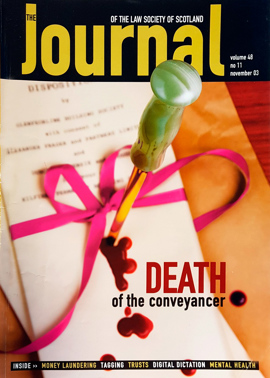Big wheels keep on turning
Change is routine. The questions are “when?” and “how can we make it work?” Justice dominates the programme for this Scottish Parliament session and the Society’s Law Reform Department and its various committees will co-operate with the Scottish Executive and the Parliament to ensure that proposals can be implemented and the right changes achieved. We also have a new Justice Ministry with which we will work to improve the quality of justice in Scotland.
Our justice system is under constant criticism – mainly from the Scots. There is a belief, often encouraged by the press, that our system does not work, but criticism is too often made without an understanding of our system – where it works and how it can be improved. This undermining of our justice system is not in the interests of the people of Scotland and does not serve them well. We read of the guilty “going free” or, if convicted, “let off lightly” – surprising conclusions in a country which imprisons more of its population per head than any other modern European democracy. We read of trials being adjourned by defence lawyers as if judges have no say in the case.
But I believe that many people in Scotland know the picture is entirely different from the one they read in the press. For those of us engaged in it, the justice system we know works robustly and well but needs improvement and has suffered from under-resourcing. Everyday in the criminal justice system people work hard, prosecuting, defending, managing the court timetable; accused persons plead guilty or not guilty and, if convicted, are sentenced by the judge or sheriff according to the circumstances of the case.
This is the real Scotland where judges do take into account the severity of the offence as well as the circumstances of the accused because the law requires it. The reality is more rational and reflects real life. Sadly from the media perspective, a report of a case being prosecuted competently and well, defended robustly and honourably, in accordance with professional duty, and sentenced appropriately if a conviction results, is not news. Nor is the report of an appeal court reversing a decision where the judge or sheriff got it wrong, which will realistically happen from time to time because judges are human.
We would all like to see the punishment fit the crime but many are very unhappy with Parliament giving powers for early release orders and remission of up to 50% of the sentence. Ending these measures is within the gift of our elected representatives, not our judges. Other options must be explored which will reduce prisoner numbers. Why not end imprisonment for non-payment of fines? For decades we have had to bear the enormous waste of taxpayers’ money in imprisoning fine defaulters. Direct deduction of fines from wages and benefits could not be easier to achieve.
The constant barrage of attacks on the justice system could undermine the public’s constitutional protection. We must defend the independence of our judges, a fundamental protection underpinning the democratic rights of our citizens. Those of us involved in the justice system must defend its virtues, which are well recognised by so many other democracies.
When I took up office I was criticised for suggesting that it would be useful for all newly elected politicians to have further training in our constitutional history. I hold the view that each component part of a democratic society should understand its role in that democracy.
The new Judicial Appointments Board will ensure that appointments are more open, accountable and in line with current thinking. The Society has been in favour of such a Board for around 20 years and welcomes the involvement of both lawyers and non-lawyers who will work together to ensure that the best people sit in judgment of cases in Scotland. At present the Board is only advisory and I urge the Executive to fulfil the undertaking given by our former Justice Minister, Jim Wallace MSP, to put the Board on a statutory footing to confirm its permanence and independence.
I hope those involved in our justice system, which is the envy of many nations, will stand up for it and work within it diligently to achieve justice for the citizens of Scotland, whether they are accused, victims or witnesses doing their public duty, and achieve positive change in the near future.
In this issue
- Big wheels keep on turning
- Outsourcing: trick or treat?
- The end of conveyancing as we know it
- A conflict of interest
- You’re tagged
- The beginning of the end
- The Scottish Law Commission’s Trust Law Review
- Disclosure: divorce lawyers and proceeds of crime
- Talking digital
- Keep an eye on your fee-earners
- Dot.com survivor!
- Determining place of payment
- Mental Health Act: care and treatment
- Affidavits in undefended divorces
- Scottish Solicitors’ Discipline Tribunal
- Jury trials in the Court of Session
- Website reviews
- Book reviews
- Preserving superiors’ rights
- Housing Improvement Task Force
- Land certificates: could this be yours?






